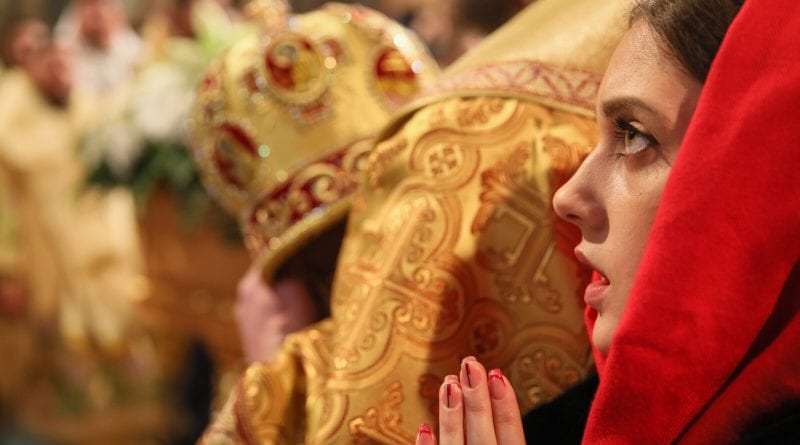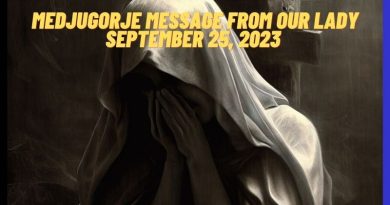Russian Orthodox see the Antichrist in the digital revolution…Rebel against “pin” numbers…Harbinger of “666” the number of the Beast?
THE NUMBER OF THE BEAST
In the Textus Receptus manuscripts of the New Testament, the Book of Revelation (13:17–18) cryptically asserts 666 to be “man’s number” or “the number of a man” associated with the Beast, an antagonistic creature that appears briefly about two-thirds into the apocalyptic vision..In modern popular culture, 666 has become one of the most widely recognized symbols for the Antichrist or, alternatively, the devil. The number 666 is purportedly used to invoke Satan. The number is cited as 616 in some early biblical manuscripts, the earliest known instance being in Papyrus 115.
by Vladimir Rozanskij
Protests in Voronezh, St. Petersburg, Moscow, Lipetsk against the introduction of a personalized PIN. The total control of the individual is feared: an “electronic lager”. Patriarch Kirill asks to respect those who reject electronic documents.

Moscow (AsiaNews) – Since 3 April, the Russians have seen their pension card replaced by a personalized PIN number, needed to access electronic services. A part of the Orthodox faithful has rebelled against this measure, which in their opinion expresses the imminent advent of the apocalyptic times.
The new law introduces the new rules for the use of state services, which provides a personalized PIN to access public administration. This is a simplification of procedures, part of the “digital revolution” announced by Putin after last year’s election for his fourth presidential term. The most observant Orthodox, who for some time have been protesting against the use of “satanic figures”, such as the tax code, speak of the imposition of the “electronic lager”.
Valentina Pashenko, president of the “Committee in defense of the family and morality” in Voronezh, does not even use credit cards, denounces the use of biometric fingerprints to enter the bank and government buildings, and rejects electronic texts.
Speaking to the BBC, Valentina said that “when all personal data will be stored in one system, evil people will be able to exclude any unwanted person from the system”. At the end of March, it organized a meeting in its city against the new PIN law, which would be associated with the identity card. About 500 people attended the event.
“First pensions and then all other information about the person, his property, social rights, data on the family and children, school and medical data, salaries: the whole life of the individual will be inserted into an electronic number”, Pashenko complains, “it is like the mark of the Stalinist camps, where our grandparents were sent”. Other protests were organized in St. Petersburg and Moscow; in Lipetsk a presidium of prayers of orthodox activists was held.
The head of the “Parental Resistance” movement, Nikolaj Mishustin, represents the interests of believers who reject any type of electronic identification number. According to him, already 40 thousand people have signed a petition against the law, in different cities of Russia. “Until now all those who wanted it could access administrative services in the traditional way,” notes Mishutin, “while this law obliges the electronic form via PIN, without even asking for consent to the processing of personal data: it is a scandalous violation of the Constitution”.
The participants in the Voronezh demonstration, as explained by Pashenko, appealed to the patriarch of Moscow Kirill (Gundjaev), to ask permission to organize processions against the new law, and condemn the “lobbyists of the initiatives clearly anti-Christian.
” The opposition of the Orthodox to digitalization is based on the words of St. John in the Apocalypse on the “number of the beast”: It forced all the people, small and great, rich and poor, free and slave, to be given a stamped image on their right hands or their foreheads so that no one could buy or sell except one who had the stamped image of the beast’s name or the number that stood for its name.(Ap 13,16-18).
In their opinion, the introduction of the PIN is a clear sign of the coming advent of the Antichrist. Some claim to recognize the cursed number not only in the codes, but also on every page of passports and other documents issued by the state.
The Orthodox Church is well aware of these concerns that have been circulating among believers for several years. Aleksandr Volkov, spokesman for the patriarch, explained to the BBC: “In the Church there are documents that illustrate how we should behave in the face of this type of initiative, and we collect many letters from worried faithful, but regarding this law we have no real objections to be presented”.
In 2013, the Synod of Russian bishops declared that it opposed the introduction of “any form of coercion by citizens regarding the use of electronic identifiers”.
Last January, speaking at the Duma, Patriarch Kirill called on the deputies to take into account the desire of citizens to refuse electronic documents. “Contemporary progress contains dangers, first and foremost for the freedom of people”, warned the head of the Russian Orthodox, “true freedom does not tolerate global control over the lives of individuals, this would be a prospect of apocalyptic ruin for all mankind. When we talk about the arrival of the Antichrist, starting from the Scriptures, we understand precisely this system of global control, realized by a single center of power, or even by a single person “.
The president of the parliamentary committee for social policies, Jaroslav Nilov, said that many appeals with criticisms of the bill come from the believers, and deputies are trying to meet them: “We asked what is the official position of the Church, which expressed itself with great prudence, but not explicitly against the law”.
The groups of “opponents of the electronic Apocalypse” do not represent the majority of citizens, and not even Orthodox believers, but they are very influential, also for the support of numerous and authoritative starets, whose word is heard even more than that of the patriarch and the president. Similar feelings exist in Russian orthodoxy since the time of the tsars and from the first modern census and population identification measures, such as the release of “internal passports” that were torn up and burned by believers.





